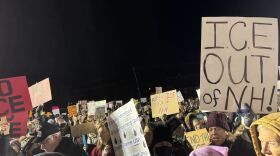New Hampshire could be at the start of another fall COVID surge, New Hampshire’s top infectious disease doctor warned Thursday, pointing to a recent rise in the number of hospital patients with COVID-19.
“There's a good chance that this increase in hospitalizations is the beginning of the fall, you know, and going-into-the-winter, surge,” State Epidemiologist Dr. Benjamin Chan said during a virtual panel hosted by GoTruthNH, a public-health education initiative.
Despite falling nationally, COVID hospitalizations have been rising in New England and other parts of the Northeast, according todata compiled by The New York Times.
In New Hampshire, 215 hospital patients were either positive for COVID-19 or recovering as of Thursday, according to the New Hampshire Hospital Association. That number had hovered between roughly 100 and 150 for most of the summer.
The state health department tracks a somewhat different metric — hospitalized patients being treated for COVID-19 — which has also been on the rise.
“Hospitals are seeing a sharp increase in COVID hospitalizations, and it's certainly a cause for concern as we look into the fall and winter months,” Steve Ahnen, president of the New Hampshire Hospital Association, said Friday.
In 2020 and again in 2021, cases and hospitalizations rose sharply in the fall and winter as colder weather drove more people indoors.
The health care system has more tools to prevent and treat COVID than it did in previous years. Those include updated booster shots that protect against newer strains of the virus, and antiviral drugs that can reduce the risk of severe disease.
At the same time, hospitals are heading into respiratory-virus season with limited bed capacity, Ahnen said. Worker shortages mean hospitals can’t staff as many beds. And some patients are staying in those beds for longer, because they can’t be discharged to long-term care facilities that have their own staffing difficulties.
“That's concerning going into the fall, before colds and flu and, you know, the regular illnesses really kick in,” said Brian O’Hearn, chief nursing officer at Androscoggin Valley Hospital in Berlin. “We're seeing an uptick in COVID right now. The bed capacity is already tight.”
Health officials are also warning that flucould circulate more widely again this winter, after two relatively mild seasons. Deputy State Epidemiologist Dr. Elizabeth Talbot said during Thursday’s panel that a resurgence of flu could increase the burden on a health care system already dealing with COVID.
“We are now fighting on two fronts,” she said.
Health officials urged people to get their flu vaccines and COVID boosters to update their immunity, reduce the risk of severe disease and ease the strain on hospitals.
Steven Roche, the clinical coordinator at White Mountain Community Health Center in Conway, acknowledged that some are tired of hearing about COVID after two-plus years. But he said it’s still important to get boosted and take other precautions.
“We’re at the point where you've been vaccinated maybe three or four times this past year and a half, and people are tired and are questioning whether or not it's worth it,” Roche said during Thursday’s panel. “And my answer is, ‘Absolutely, yes. We're still in the middle of this.’”







